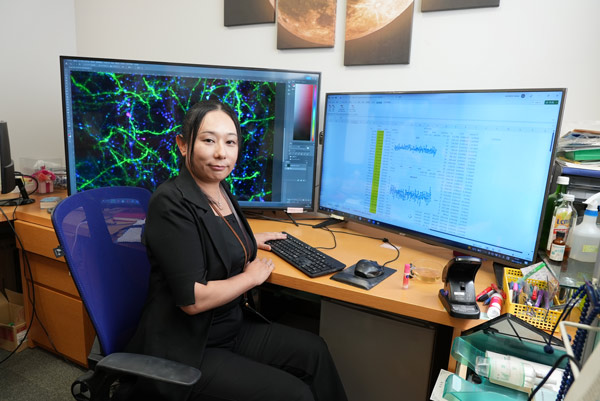Dec. 21, 2023
Looking at abnormal synapse function
Akiko Hayashi-Takagi, Team Leader
Please describe your role at RIKEN.
I’m a former practicing psychiatrist, but now I use my knowledge to conduct basic research into understanding psychiatric disorders. While there are many excellent neuroscientists at RIKEN, few have clinical expertise and I want to act as a bridge to integrate basic psychiatry, clinical psychiatry and basic neuroscience.
Please briefly describe your current research. Why is it important?
Several lines of evidence, including human genetics, strongly suggest that abnormalities in the function of synapses are an underlying cause of psychiatric disorders. However, no-one knows which synaptic abnormalities alter the function of neurons and neural circuits and ultimately lead to behavioral changes. Our strategy has been to search for causal relationships between synapses, neurons, neural circuits and behavior in a multiscale manner.
How did you become interested in your current field of research?
One important technology that is very useful is a platform my group uses for identifying new metabolites using highly sophisticated and sensitive mass spectrometry instruments.

What excites you the most about your current research?
It is most gratifying when, after conducting difficult experiments, we obtain reliable data and the results are published in a decent academic journal. I am particularly proud of a recent paper that indicated that abnormal synaptic strength is involved in the physiology of schizophrenia.1
What made you decide to become a scientist?
The physiology of psychiatric disorders is so poorly understood, and it is shocking that there are so few curative treatments. I wanted to contribute to the understanding of these disorders through basic research.
What do you think has been the most interesting discovery in your field in the last few years? How has it influenced your research?
Electrophysiological experiments with human neurons by a group led by Matthew Larkum at Humboldt University of Berlin have provided fascinating insights. They uncovered a unique human dendritic computational mechanism. This result was such an eye opener to me that I decided my lab would start studying primates, including humans, rather than mice. I believe it is one of the essential strategies for understanding psychiatric disorders in people.
“My research is important for sustainable development or society because….”
… the acquisition and maintenance of mental health is one of the most important things for human beings.
How has being at RIKEN helped your research?
The staff at RIKEN are the best of all the institutions I have belonged to. Not only are they extremely competent, but they are dedicated and supportive of my research. There is a strong sense of camaraderie, and a sense that we are working as a team.
Rate this article
References
- 1. Obi-Nagata, K., Suzuki, N., Miyake, R., MacDonald, M. L., Fish, K. N., Ozawa, K., Nagahama, K., Okimura, T., Tanaka, S., Kano, M. et al. Distorted neurocomputation by a small number of extra-large spines in psychiatric disorders. Science Advances 9, eade5973 (2023). doi: 10.1126/sciadv.ade59731
- 2.Extra-large synapses could be a cause of schizophrenia

